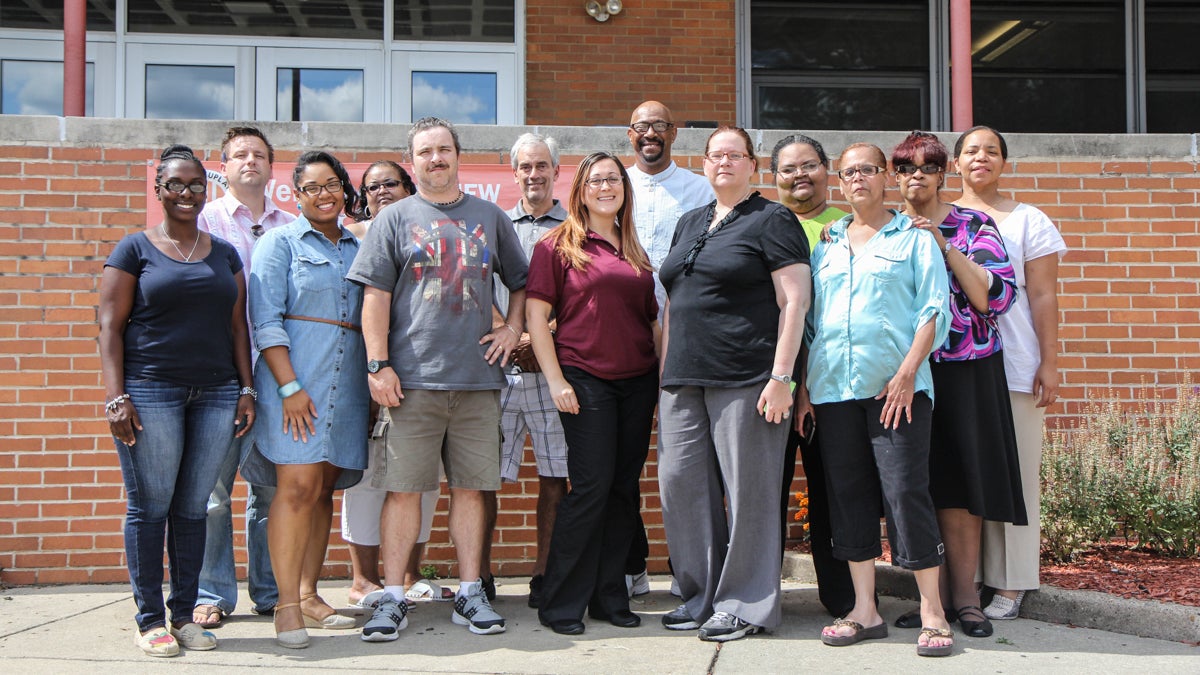Chester Upland can’t pay its teachers — but they’re working anyway
Listen
Chester Upland teachers at Science and Discovery High School in Chester, Pa. (Kimberly Paynter/WHYY)
Teachers union president Michele Paulick said she received some unwelcome news at the Chester Upland School District teacher convocation this week.
“Our superintendent, Gregory Shannon, read a letter from our receiver, Francis Barnes, that informed the teachers that there are no funds,” said Paulick, who described feeling “shock, frustration and anger” at the news.
However, in a Thursday evening vote, the 200-member union decided unanimously to work without pay for as long as individual members are able, Paulick said. The Chester Upland School District educates about 3,500 students, with nearly the same number attending area charter schools.
“We arrived at the decision to continue working because we have to put our children first,” she said. “It’s not their fault we’re in this situation.”
Two factors put Chester Upland in an especially difficult position. The district, which has been designated fiscally distressed for more than 20 years, is carrying a $24 million budget deficit from the last school year. Thanks to Pennsylvania’s ongoing budget gridlock, no money is flowing into the district from state coffers.
With no fund balance and no money coming in, officials said they won’t be able to make payroll for the first week of school, which starts Wednesday.
The parent union, the Pennsylvania State Education Association, is helping to raise funds to supplement teachers’ loss of income. This is the second time in recent memory that Chester Upland teachers voted to work without pay. In 2012, the district ran out of operating funds in January and asked for an emergency infusion of cash from then Gov. Tom Corbett.
This year, the timing is worse, said Paulick. “We haven’t had any paychecks coming in over the summer, so it was very difficult to budget” for the coming weeks.
News that the district is too broke to operate comes on the heels of another blow to the district’s finances. Earlier this week, Delaware County Court of Common Pleas Judge Chad Kenney rejected several portions of a recovery plan that would have eliminated the district’s existing fund deficit.
The plan, backed by Gov. Tom Wolf, proposed eliminating the $24 million deficit, largely by cutting back special-education tuition payments to charter schools. Those payments have ballooned in recent years to $40,000 per student, regardless of how severe — and therefore expensive — the student’s disability may be.
Wolf spokesman Jeff Sheridan said the receiver and state advisers to the district “are reviewing our options for further corrective action” based on Kenney’s comments.
When the budget is finally passed, “all districts would have the money come to them retroactively,” said Sheridan. Other districts have cut charter payments or taken out loans to cover their costs while the state budget negotiations sputter along.
Pennsylvania is two months into the fiscal year with no budget as Wolf and GOP legislative leaders wrangle for a spending plan that bends to their priorities.
Paulick said the impasse is “a travesty.”
“We are out here serving our community and serving our students, and we just need the support from our elected officials,” she said.
WHYY is your source for fact-based, in-depth journalism and information. As a nonprofit organization, we rely on financial support from readers like you. Please give today.

